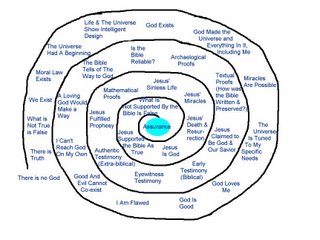
I find this criticism a lot in secular circles and while I understand the concept that you can't use a single source to verify itself, let me clarify something. The Bible (or even the New or Old Testaments) is not a single source. It wasn't written by one person. It isn't even one book (although today it's bound together to look like one). It wasn't written within the same century or even the same millennium. There are an estimated 44 authors, 66 separate historical texts, and the documents span approximately 1500 years. Furthermore, the methods of preservation, record-keeping and maintenanc of textual accuracy far exceed those required to verify the authenticity of any other ancient historical texts. So, can it be used to verify itself? Certainly it can! There are extra-biblical records, as well, of course. Josephus is one, Pliny the Younger is another (anti-Christian, actually), and there are more.
Keep in mind that modern historians require three primary sources in order to confirm the details of any past event. They use things like newspapers, letters, scientific evidence, eye-witness accounts, etc. The closer to the event, the more reliable the source, and eye-witness accounts are the best of all. When it comes to Jesus's resurrection, for example, (which is the single most important event for all Christian belief--I Cor. 15:17) the Bible provides us those three eye-witness accounts written by people who were actually there (Matthew, John, & Paul). And it is recorded that more than more than 500 people saw the risen Christ, many of them named. Nearly all of them were still alive at the time the account was being circulated, and not one ever came forward to refute the account.
But, that's not all. We also have original manuscripts preserved in their entirety that can be scientifically verified as authentic. So, not only does the "circular reasoning" argument not hold water, it quickly reduces to absurdity. It suggests that nothing can be believed without MORE than three, verified, authentic, eye-witness accounts. In that case, we would have to say good-bye to nearly every news and historical source we have today.
Recognizing the truth in the Bible (because we CAN use one book of the Bible to verify another) certainly does not depend on circular reasoning. Jesus doesn't need to rely on circular reasoning to entice people to believe. He didn't say, "I'm God because I said so." Though He claimed to be God, the Messiah, He also said, "Do not think that I have come to abolish the Law or the Prophets; I have not come to abolish them but to fulfill them." (Matthew 5:17) Jesus was referring to His fulfillment of prophesy. Since He fulfilled nearly 300 of them, I'd say that was enough extra evidence to back up His claim. (See this post.)


